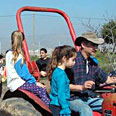
The summer holiday is already upon us, but some 120 families in the community of Shoham are already working ardently to have the new school they have set up ready for September 1. What makes this new school so unique is the fact that it belongs to a mixed community of secular and religious families, who chose to educate their children together.
"On the other hand, we have religious families who feel that the religious education is moving in the haredi-nationalist direction that doesn't reflect the way they want to raise their children."
Eyal and the other community members believe that the time of separate education system has passed. "Why should a secular and a religious teen meet each other for the first time in the army, when they are already full of stereotypes on one another? Why shouldn't they learn together and respect each other from a young age?" he asked.
First urban community
And the Shoham families are not alone. There are currently about 20 such communities in Israel, numbering a total of some 2,000 families. The first communities were created in the 1980s, following the decision to found mixed residential communities like Eshchar, Kramin and Nokdim. In the beginning of the current decade, a significant change took place with the inception of the mixed community in the city of Modiin, the first urban community of its kind.Less than a decade later, more than 600 children attend the community's six nurseries, elementary school, junior high school and high school.
"The educational team is made up of religious and secular teachers who go through a special training course to understand the schools' uniqueness," explained Rina Kreuzer, one of the founders. "We have kids who go to the synagogue on Shabbat and others who go to the beach, and they all want to share their experiences.
"What makes us special is the fact that we respect everyone's private sphere and believe they can act as thy please," she added.
In addition to the schools, the community also runs various cultural activities, a choir, a theater and a Beit Midrash that serves both religious and secular members.
Another mixed community lives and operates in Mazkeret Batya. The community's 150 families have opened a school that's based on a rather different model than the one in Modiin. Here the students attends most classes together, but are divided into two groups during Jewish studies classes, according to their worldview. However, some of the classes are held jointly for all students, and focus on universal values.
The community also celebrated the holidays together, joins together for social activities and publishes its own journal.
Last week the members of these communities inaugurated at the Knesset the mixed communities' network. The network's goal is to assist the existing communities and help them deal with problems and dilemmas, and also to encourage the foundation of new communities and become an influential factor in Israeli society.
"Israeli society needs mixed communities," said the network's coordinator Asaf Hirschfeld, of the Mazkeret Batya community. "We want this way of life to become a national experience," he added.















